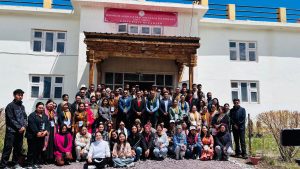The three-day National Seminar on “Medicinal Plants Conservation and Management: Trans-Himalayan Perspective” concluded successfully.

The three-day National Seminar on “Medicinal Plants Conservation and Management: Trans-Himalayan Perspective” concluded successfully at the Leh campus of the School of Agricultural Sciences and Technology (SAS&T), University of Ladakh (UoL). Sponsored by the National Medicinal Plants Board (NMPB), Ministry of AYUSH, Government of India, the event brought together over ninety participants, including researchers, academicians, policymakers, Amchi practitioners, and community stakeholders. Discussions centered on strategies for conservation, sustainable utilization, and promotion of medicinal plants in the Trans-Himalayan region, renowned for its diverse and valuable medicinal flora. Experts from reputed institutes enriched the dialogue through research presentations and interactive sessions.
The inaugural session was graced by Prof. (Dr.) Saket Kushwaha, Hon’ble Vice Chancellor, UoL; Shri Jigmet Takpa (IFS), Former Joint Secretary, MoEFCC; Prof. Gopal S. Rawat, Former Director, Wildlife Institute of India; Dr. Padma Gurmet, Director, NISR; and Prof. Dorjay Namgyal, Dean, SAS&T, among other dignitaries. The opening ceremony also witnessed the release of informational pamphlets and keynote addresses highlighting the importance of medicinal plant conservation.
On the second day, four technical sessions covered themes such as indigenous knowledge systems, ecological services, sustainable harvesting, the role of Sowa-Rigpa, and significant medicinal flora of Ladakh. Eminent experts from WII-Dehradun, CSIR-CIMAP, GB Pant Institute, CAZRI, KVKs, and Sowa-Rigpa institutions presented their work. The release of the abstract book and the valedictory function, with Prof. G.S. Rawat as Chief Guest and Dr. Tashi Thinles as Guest of Honour, added significance to the proceedings.
The concluding day featured a field visit to Wari-La Pass, where Prof. Rawat and Dr. Amit Kumar guided participants in identifying over fifty medicinal and aromatic plants, emphasizing ecological importance and conservation needs. An Amchi practitioner further enriched the session by explaining traditional uses under the Sowa-Rigpa system. The seminar concluded with recommendations and a collective call for collaboration between modern science and traditional knowledge to ensure sustainable management of medicinal plants in the Trans-Himalayan region


